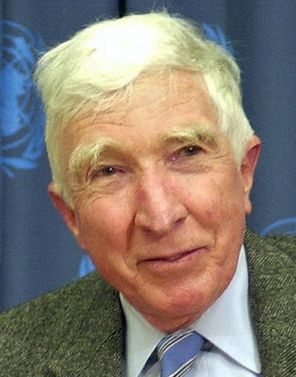Shortly before The John Updike Society convened in Reading, Pa. for their 6th Biennial Conference, Jonathan Clarke published a piece in City Journal titled “John Updike and the Politics of Literary Reputation.” In it, he assesses the current problem: Updike’s fall from literary grace during a time of “cancel culture” and the #metoo movement.
“His is a striking case study in the politics of literary reputation in a time of generational upheaval,” Clarke writes. “Updike has not been a victim of cancel culture. He merely represents the ancien regime.”
Clarke suggests that “Updike’s self-effacing public manner now looks like a tactical error in the long game of literary reputation. Philip Roth and Toni Morrison never tired of singing the song of themselves—and why not, in the end, when the world is so crowded and busy? It’s not that Updike was modest about his talent; it’s simply that he embodied the cultural style we associate with American Protestantism. The vanquishing of that once-dominant mode has contributed to a growing incomprehension of Updike’s work.”
Of course, questioning Updike’s status as a writer of stature is nothing new. Those who have followed the critical response to Updike’s work will think immediately of John Aldridge’s early claim that Updike might be a great stylist but that he “has nothing to say.”
In 2014, The New Republic took up the issue again in a debate between English comedian, novelist, and TV personality David Baddiel and literary critic-biographer Jeffrey Meyers: “John Updike: Tedious Suburbanite, Literary Great.” Prompting the debate was the release of the Adam Begley biography, Updike.
Baddiel argues on the “for” side. He begins, “Let’s begin by making one thing clear. John Updike was the greatest writer in English of the last century. Unquestionably, he was the best short story writer; I would argue the best novelist, certainly of the postwar years; one of the very best essayists and in the top 20 poets.” On the negative side, Meyers calls Updike’s New Yorker contributions “made-to-order” and dismisses the magazine entirely as a group of editors and contributors who engaged in “mutual admiration” and “quarrelled over a semicolon but encouraged facile content and ironed out all traces of distinctive style.” Meyers concludes, “Updike, cherishing every scrap of his personal life and striving for mythical significance in his daily doings, fell back on the trivial and tedious details of his small-town childhood.” Ironically, in his biography of Hemingway, Meyers doesn’t take that author to task for mining his own adolescence to create a series of stories set in Michigan, or later stories and novels that also reflect Hemingway’s lived experiences. So maybe it all comes down to a long-debated aesthetic question: what is a suitable subject for art?


The reason I kept buying and reading the works of John Updike is that while reading his works I felt I was listening to the score of my life composed by a master composer/conductor. A Tchaikovsky for my romantic soul.
His reputation is sullied by those who have never felt the throb of man’s temptations, of the beauty and the beast.